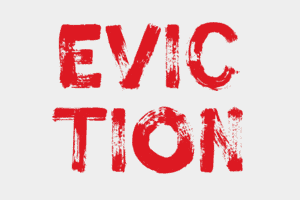It’s surprising how fast evictions happen. The time from when you get your landlord’s notice to the sheriff putting a lock on your door can be only 60 days.
San Francisco passed Proposition F on June 5th with 56% voter approval. Now the City of San Francisco is to start funding eviction legal help for tenants who request it, but the initiative won’t go into effect immediately.
The ballot measure states “as soon as practical, but not later than 12 months after the effective date of this Initiative.” It’ll likely be closer to twelve months, so many San Francisco tenants will not be protected for about a year.
Others in the surrounding Bay Area without the same eviction protection will not so lucky. The calamity that eviction brings is evident in a new report issued by the statewide tenant organization, Tenants Together, aptly titled “California Evictions are Fast and Frequent.”
New data available
The report features previously unreleased data from the state Judicial Council, a policy-making body of the California courts. The data made available was from 2014 to 2016. However, it doesn’t seem likely that the results would have changed for 2017 or 2018.
Unfortunately, the data isn’t available for San Francisco County or several other high-populated counties that are part of the Bay Area.
Still, as a snapshot view, the data is surprising.
First, an overview
While there are several different types of eviction, let’s say you are in a dispute with your landlord.
If you live in a rent-controlled home in San Francisco, an eviction can start with the landlord giving you a Notice to Cure, a Notice to Quit, or a Notice to Pay Rent. (If you don’t live in a rent-controlled apartment San Francisco or live in other communities requiring a “just cause” eviction, you may get only a 30-day or 60-day notice to move.)
If you do not cure, quit, or pay within the notice period, then the landlord files an Unlawful Detainer, or an eviction lawsuit.
As I wrote in my blog, “What Happens in the Eviction Process?,” it’s a summary proceeding. Everything moves fast. You have only five calendar days to file a response. The days can include Saturday, Sunday, and even Thanksgiving or Christmas.
The only exception is that the five-day period cannot end on a weekend or holiday. If it does, then you have to file your papers until the next day that the court is open.
How Quickly You’re Evicted
If you don’t file a response within five calendar (not business) days, the landlord can get a default judgment against you. This means that you lose automatically. The sheriff will post a notice to vacate. Then the sheriff locks you out. All this can happen within 2 weeks.
Five days is a short time to figure out how you should respond. There are few resources available to low-income people. As I wrote in my last blog, “Giving You a Fighting Chance with Prop F,” you may make over the amount to qualify as low income, you still might not be able to afford an attorney. (I always suggest you find an attorney if you can, because of my experience of landlords reassessing their strategy knowing that the tenant has an experienced counsel to fight for their tenant rights.)
Getting a default judgement
Some tenants, however, ignore the paperwork or they misjudge how much time they have to response. Others may fill out the response incorrectly. This can result in landlord getting the clerk to file a default judgement, which is most defaults.
What’s happening in California
The statistics in the report “California Evictions are Fast and Frequent” released by the Judicial Council show the amount of defaults in many California counties.
Here’s the results for the reporting Bay Areas Counties:
- Alameda: 29%
- Contra Costa: 41%
- Napa: 22%
- Santa Clara: 37%
- Solano: 0%
- Sonoma: 40%
Excepting Solano County, which looks like a statistical anomaly, the percentage of default judgements obtained by landlords in eviction lawsuits is between 22% to 41%.
The statewide average of those counties reporting was 40%.
I’d like to see the results from the heavily populated counties like San Francisco and Los Angeles. I’ll bet the percentage of defaults is high.
What does this tell you? That the landlord has a high chance of winning an unlawful detainer strictly by filing the paperwork.
We can do more
This is why it’s significant that Proposition F passed in San Francisco passed, and why other municipalities should pass a similar initiative.
We can do even more. Only a few municipalities in California require the landlord to file when he gives you a notice. The report advocates requiring landlords to file these notices, in order to give a truer picture of evictions, since some tenants will move when they get this first notice.
I agree landlords should be required to file the first notice. I’ve seen many “notices” that don’t follow the law but are geared to scare you into moving. Such a requirement would force landlords to follow the requirements of the ordinance.
Quickly evicted
The Judicial Council data in the report indicates how fast evictions happen. According to the 2017 statistics, nearly 75% of the eviction case are resolved within 45 days of filing. Nearly 60% are resolved within a month.
That’s incredibly fast. You could have no home within a month and a half.
If you have a rent-controlled home, it’s even tougher to finding a new one. You’re going to have to pay market rent. You might not be able to afford it.
No wonder I see so many tenants who are scared.
Have you received an eviction notice and are unsure whether it follows the requirements of the Rent Ordinance for the city where you live? You should consider talking to an experienced tenant attorney who can help you with your issues.
Know your rights. Protect yourself.


 (415) 533-0735
(415) 533-0735 (415) 843-0496
(415) 843-0496